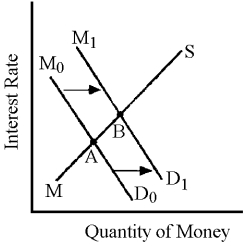Exam 33: Budget Deficits in the Short and Long Run
Exam 1: What Is Economics?227 Questions
Exam 2: The Economy: Myth and Reality150 Questions
Exam 3: The Fundamental Economic Problem: Scarcity and Choice250 Questions
Exam 4: Supply and Demand: An Initial Look308 Questions
Exam 5: Consumer Choice: Individual and Market Demand202 Questions
Exam 6: Demand and Elasticity209 Questions
Exam 7: Production, Inputs, and Cost: Building Blocks for Supply Analysis216 Questions
Exam 8: Output, Price, and Profit: The Importance of Marginal Analysis189 Questions
Exam 9: Securities: Business Finance, and the Economy: The Tail that Wags the Dog?198 Questions
Exam 10: The Firm and the Industry under Perfect Competition208 Questions
Exam 11: Monopoly203 Questions
Exam 12: Between Competition and Monopoly225 Questions
Exam 13: Limiting Market Power: Regulation and Antitrust152 Questions
Exam 14: The Case for Free Markets I: The Price System220 Questions
Exam 15: The Shortcomings of Free Markets212 Questions
Exam 16: The Market's Prime Achievement: Innovation and Growth110 Questions
Exam 17: Externalities, the Environment, and Natural Resources217 Questions
Exam 18: Taxation and Resource Allocation219 Questions
Exam 19: Pricing the Factors of Production228 Questions
Exam 20: Labor and Entrepreneurship: The Human Inputs223 Questions
Exam 21: Poverty, Inequality, and Discrimination167 Questions
Exam 22: An Introduction to Macroeconomics211 Questions
Exam 23: The Goals of Macroeconomic Policy207 Questions
Exam 24: Economic Growth: Theory and Policy223 Questions
Exam 25: Aggregate Demand and the Powerful Consumer214 Questions
Exam 26: Demand-Side Equilibrium: Unemployment or Inflation?210 Questions
Exam 27: Bringing in the Supply Side: Unemployment and Inflation?223 Questions
Exam 28: Managing Aggregate Demand: Fiscal Policy205 Questions
Exam 29: Money and the Banking System219 Questions
Exam 30: Monetary Policy: Conventional and Unconventional205 Questions
Exam 31: The Financial Crisis and the Great Recession61 Questions
Exam 32: The Debate over Monetary and Fiscal Policy214 Questions
Exam 33: Budget Deficits in the Short and Long Run210 Questions
Exam 34: The Trade-Off between Inflation and Unemployment214 Questions
Exam 35: International Trade and Comparative Advantage226 Questions
Exam 36: The International Monetary System: Order or Disorder?213 Questions
Exam 37: Exchange Rates and the Macroeconomy214 Questions
Select questions type
In 2010, many politicians argued that the deficit should be reduced at all costs but many economists countered that deficit reduction would be problematic given the state of the economy.
(True/False)
4.9/5  (40)
(40)
Economic principles suggest that we should focus on balancing the budget rather than balancing aggregate supply and aggregate demand.
(True/False)
4.9/5  (37)
(37)
When the economy has substantial additional saving, deficit spending will have a large "crowding out" effect.
(True/False)
4.9/5  (33)
(33)
The U.S.national debt at the end of fiscal year 2010 was almost
(Multiple Choice)
4.8/5  (32)
(32)
Figure 16-3
 -If budget deficits shift the money demand curve as is illustrated in Figure 16-3, which component of total expenditures will be affected the most?
-If budget deficits shift the money demand curve as is illustrated in Figure 16-3, which component of total expenditures will be affected the most?
(Multiple Choice)
4.9/5  (39)
(39)
The primary conclusion of using inflation accounting is that inflation
(Multiple Choice)
4.9/5  (31)
(31)
The American national debt, like the Greek debt in 2010, is an obligation to pay primarily in foreign currencies.
(True/False)
4.9/5  (34)
(34)
What is "crowding-in" effect? Explain the factors which determine the strength of the crowding in effect.
(Essay)
4.8/5  (31)
(31)
The Fed and the government are working against each other if, as the government cuts taxes to promote economic growth, the Fed
(Multiple Choice)
4.8/5  (38)
(38)
It is most likely that the federal government will never actually pay off the national debt.
(True/False)
4.7/5  (35)
(35)
A budget deficit will be least inflationary if the aggregate
(Multiple Choice)
4.8/5  (36)
(36)
Describe the particular policy mix that accounts for the favorable economic conditions of the late 1990s.Be sure to specify the fiscal and monetary policies pursued during this period.
(Essay)
4.8/5  (44)
(44)
The statement that "repaying our enormous national debt will ruin the nation" is
(Multiple Choice)
4.9/5  (37)
(37)
Which of the following is expected to increase aggregate demand in the short run?
(Multiple Choice)
4.9/5  (36)
(36)
Showing 21 - 40 of 210
Filters
- Essay(0)
- Multiple Choice(0)
- Short Answer(0)
- True False(0)
- Matching(0)